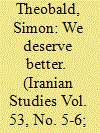|
|
|
Sort Order |
|
|
|
Items / Page
|
|
|
|
|
|
|
| Srl | Item |
| 1 |
ID:
187947


|
|
|
|
|
| Summary/Abstract |
Sectarian polemic directed at Sunni Muslims in Iran and elsewhere in the Shi’ite world has traditionally foregrounded the historic conflict over and fallout from the Prophetic succession as one of the primary markers of Sunni difference. In contrast to this precedent, I argue that we are witnessing the emergence of a newly formulated parallel discourse in the trajectory of sectarian polemic that is rooted less in such age old concerns and instead couches difference more as a matter of the supposedly problematic contemporary social behaviours of the maligned community. In demonstrating this, I focus on two elements—efforts to associate the Sunni populations at large with fanaticism and violence, and the construction of Sunni Muslims in Iran as hyper-fertile. Drawing on a mixed methodology of media analysis and anthropologically informed ethnographic fieldwork in Mashhad, Iran’s second largest city, this paper concludes by pointing to the origins of this rhetoric in a confluence of the weakening of traditional mythopoetic discourse among the youthful middle-class, their replacement by a new ‘nationalist Shi’ism’, and its subsequent receptivity to a globally circulating anti-migrant and nativist ideology.
|
|
|
|
|
|
|
|
|
|
|
|
|
|
|
|
| 2 |
ID:
177057


|
|
|
|
|
| Summary/Abstract |
This article argues that even as Chinese imports occupy an increasingly large percentage of the space in Mashhad’s bazaars and marketplaces, such goods are interpreted not only as being of poor quality but, critically, as insufficiently “worthy” of the Iranian middle class who positioned themselves as “deserving better.” In attempting to assess why this is the case, the article suggests that such framing both reveals much of, and requires us to consider, the pivotal role of status in Iran. It holds that this concern for status is expressed at multiple levels: that of the family, as a class, and finally, of the nation. At each of these levels of expression, it is possible to trace different post-revolutionary social phenomena. These include the reification of the family as a moral unit, major shifts in the demographics of education and urbanization, the rise of a consumer culture and the perilous decline of the fortunes of the middle class, and, finally, imaginings of national exceptionalism. This article then uses such readings of Chinese goods as a window into middle class ideologies of worth and deservingness.
|
|
|
|
|
|
|
|
|
|
|
|
|
|
|
|
|
|
|
|
|